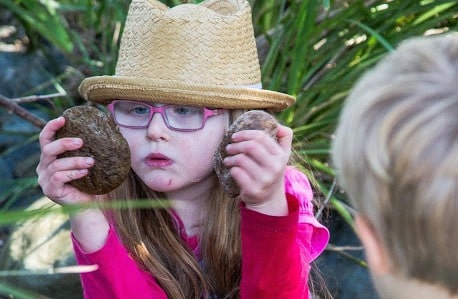It’s simple really – take the kids outside into nature and play. We don’t need lots of equipment, money or resources – just our bodies, our imagination and our time.

Kids love splashing in puddles, rock hopping down a river, making mud pies, climbing trees, and exploring wild spaces. While the kids are playing, the are of course learning an enormous amount. I loved being outside as a kid, my kids do too.
Playing in nature is actually essential for kids healthy physical, emotional and mental development. It helps them connect with themselves, others and the environment in a respectful and creative way.
Sadly more and more children spend much of their time either indoors, on screens, or in organised activities. There is a term for this – Nature Deficit Disorder, coined by Richard Louv 10 years ago – not a medical condition, but a metaphor. However paediatricians are now prescribing nature and research around the world shows that more time spent in nature reduces symptoms of ADHD and depression, and improves mental cognition and creativity.
This year I started running Nature Kids (an Ethos Foundation program) to bring children together to play in the natural spaces of our ecovillage – exploring, climbing, creating, making, painting, dancing, running, splashing – sharing what our local kids do naturally all the time. It struck me that a lot of other kids in the region would love to do this too. The whole focus is to have a fun and enriching time, connecting children with each other and the amazing world around us.

The need for the program was made obvious. Within 36 hours of putting the first Nature Kids event up on facebook – it filled, same each time. Both the kids and the parents have made lots of new friends and it’s strengthened our homeschooling network too.

- Children who play regularly in natural settings are sick less often.
- Children who spend more time outside tend to be more physically active and less likely to be overweight.
- Children who play in natural settings are more resistant to stress; have lower incidence of behavioural disorders, anxiety and depression; and have a higher measure of self-worth.
- Children who play in natural settings play in more diverse, imaginative and creative ways and show improved language and collaboration skills. Single use, repetitive play equipment becomes boring quickly.
- Natural, irregular and challenging spaces help kids learn to recognise, assess and negotiate risk and build confidence and competence.
- Children who play in nature have more positive feelings about each other.
- Bullying behaviour is greatly reduced where children have access to diverse nature based play environments.
- Symptoms of Attention Deficit Disorder are reduced after contact with nature.




I am happy to read your article.
Thanks for share the article.
Thank you so much.
browse around this website